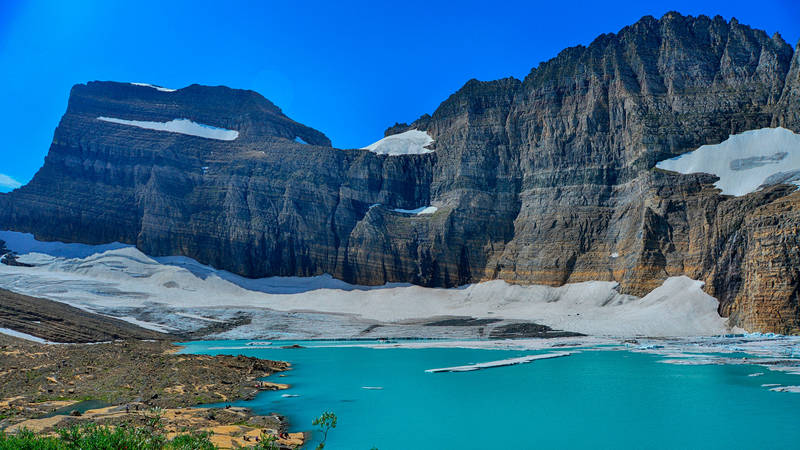As the president shares his State of the Union address with a bitterly divided Congress, love for our parks is one of the few things they can actually agree on — and still fight for.
Tomorrow night, President Joe Biden will set his priorities for the country in his first State of the Union address, and climate change will likely be a major focus of his speech. Just today, the Intergovernmental Panel on Climate Change released sobering information on how the crisis is even more urgent than our world’s best scientists had predicted. As the worsening crisis continues to threaten our health and our communities, including our parks, we need strong leadership — from the administration and from Congress — to save our children and the world as we know it from the most severe effects.

New National Poll Finds Parks Are Political and Physical Solution to Address Climate
“As the worsening climate crisis continues to threaten our health and our communities, this poll shows national parks unite us and offer solutions for addressing it.”
See more ›Can national parks, which are affected disproportionately by the crisis, serve as common ground to advance some of the responsible climate policies that failed in the Senate last year? Staff at NPCA not only believe it is possible, we are also fighting hard to make it happen.
Americans overwhelming love our national parks, regardless of political party, and the same is true for members of Congress. Even as some of our country’s most beloved places burn in wildfires, sink under rising waters and dry up in withering heat, many parks still experienced record-setting visitation last year. Our parks have been places of refuge and solace during the pandemic. And Congress has overwhelmingly shown bipartisan support for these places, passing historic system-wide funding in the 2020 Great American Outdoors Act and unanimously voting to expand our park system with the Amache National Historic Site Act earlier this month.
Congress doesn’t want to see our glaciers melt, our Joshua and Sequoia trees burn, or Harriet Tubman’s former homesite wash into the ocean. But the clock is ticking, and we need real action now.
Biden’s $1.75 trillion Build Back Better bill proposed historic investments in our national parks and communities. Despite it hitting a wall in December, the president and members of Congress have not given up work on a bill that fights climate change. In fact, what many members of Congress supported and appear to still agree on are clean energy and climate programs. We urgently need strong bipartisan cooperation to address these issues.
Any policy that moves forward must include three key investments for our national parks and surrounding communities.
1. National Park Staffing and Operations
NPCA is calling for the biggest investment ever — nearly $15 billion — to address climate change in our national parks. This funding will:
- Bring thousands of staff back to the parks who have critical expertise as resource protection specialists, ecologists, hydrologists, preservationists, archaeologists and other personnel to study resources and help protect them.
- Rebuild or relocate facilities such as visitor centers and museums that house historic artifacts and irreplaceable cultural resources, such as the work to protect the historic villages at Cape Lookout National Seashore from sea level rise and more intense storms.
- Create a civilian climate corps to put people to work in national parks repairing and rebuilding infrastructure, creating jobs that support vulnerable communities.
2. Clean Energy and Vehicles in National Parks and Beyond
To transition to a sustainable future, we must fund clean energy sources, both inside and outside our national parks. Investing $320 billion in renewable energy production and responsible transportation options will allow parks to:
- Install renewable energy infrastructure such as wind, solar and thermal systems in and around national parks to reduce greenhouse gas emissions.
- Transition the National Park Service’s vehicle fleet to carbon-efficient vehicles, like the new cost-efficient battery-electric buses that serve as visitor shuttles at Zion National Park.
- Reform the country’s oil and methane gas program to make it more fair to taxpayers, charging oil and gas companies higher rates to drill in our public lands and waters, and raising billions for future climate resiliency work in and around national parks.
3. Resiliency for our national park riverbanks and seashores
Rising ocean levels are harming plant and animal life and threatening historic structures in dozens of national parks along America’s coastlines. NPCA supports investing $6 billion in shovel-ready shoreline and wetland restoration projects around coastal parks such as Everglades and Indiana Dunes. Investments would also be used to create more sand dunes, wetlands, barrier islands and coastal forests to protect vulnerable coastal areas at national parks such as Fire Island National Seashore that are threatened by intensifying storms or archaeological sites at Olympic National Park threatened by rising sea levels.
If anything can bring bipartisan compromise back to Congress, it’s our national parks. And if we ever hope to safeguard our parks, the resources they protect and the stories they hold for future generations to experience, our politicians must work together to act now.
About the authors
-
 Chad Lord Senior Director of Environmental Policy and Climate Change, Government Affairs
Chad Lord Senior Director of Environmental Policy and Climate Change, Government AffairsChad Lord serves as the Senior Director for NPCA's Waters program. The program focuses on protecting and restoring America’s greatest natural treasures--large-scale aquatic ecosystems--surrounding national parks.
-
 Angela Gonzales Associate Director, Communications
Angela Gonzales Associate Director, CommunicationsAngela joined NPCA in October 2017 and is an Associate Director of Communications. She currently manages outreach and communications for the Government Affairs team and Conservation Programs.


